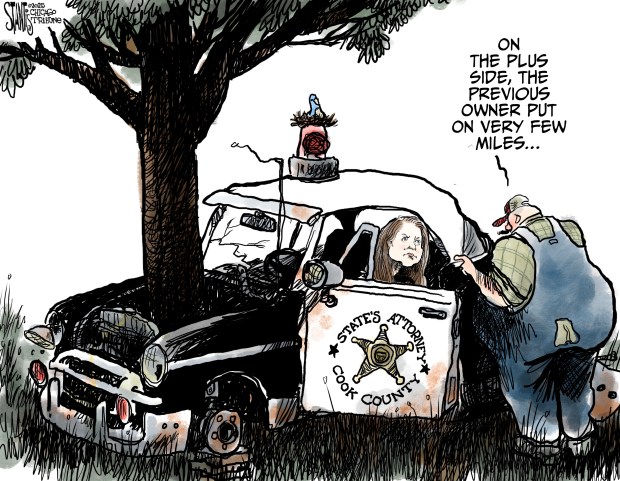Why should anyone take J. Ann Selzer at her word? That’s the question the Tribune Editorial Board should have asked before blindly defending one of the most egregious polling errors in history. Instead, the board chose faith over facts, brushing aside a staggering 1 in 3.5 million statistical improbability as a mere mistake.
The Center for American Rights (CAR) filed a lawsuit in Iowa state court against the Des Moines Register, polling firm Selzer & Co. and founder Selzer, and Register parent company Gannett Co. based on the incredibly inaccurate November Iowa poll. The lawsuit alleges violations of Iowa’s consumer fraud laws and election interference, focusing on the reckless decision to publish polling results that misled readers and distorted public perception just days before the election.
The suit, filed alongside similar litigation from President-elect Donald Trump, is on behalf of a Register subscriber and expands the claims to include damages for consumers misled by the poll’s publication. This isn’t just about a single poll — it’s about holding media organizations accountable for abandoning professional and ethical standards.
Let’s review what happened: In the days before the 2024 election, Selzer released and the Register published a poll showing Vice President Kamala Harris leading Trump by 3 points in Iowa — a state Trump won by wide margins in 2016 and 2020. Her poll wasn’t just wrong — it missed the mark by 16 points, with Trump ultimately winning Iowa by a landslide 13-point margin.
In a Dec. 19 editorial, the Tribune Editorial Board dismissed this as an innocent error, writing, “We take Selzer at her word that she simply got things wrong.” But the numbers tell a different story. Selzer’s poll wasn’t just an outlier — it was statistically implausible. Her prediction contradicted not only Iowa’s electoral history but also every other reputable poll available at the time.
Even polls conducted by other Gannett-affiliated organizations, such as USA Today, accurately captured Trump’s growing momentum. In Arizona, a poll showed Trump leading by 6 points in late September; he won by 5.5. In Wisconsin, a poll showed him up by 1 in late October, which matched the final result. Pennsylvania’s poll indicated a tie in late October, and Trump ultimately won by 1.7%. The trend was clear everywhere — except in Selzer’s inexplicably flawed Iowa numbers.
The editorial board’s defense of Selzer isn’t journalism; it’s blind faith disguised as analysis. Why would the board accept her excuse without scrutiny? Why should anyone “take her at her word” when the data tells a different story — a story of reckless reporting, or worse, a failure of basic standards of integrity and accuracy?
This isn’t about a single mistake. It’s about how institutions protect their own, even when the public trust is at stake. Would the editorial board extend this benefit of the doubt to a conservative pundit or Republican-aligned institution that made a similar error?
Circling the wagons to protect Selzer represents everything wrong with modern media. It’s no wonder public confidence in journalism is at an all-time low. According to Gallup, just 31% of Americans say they have a “great deal” or “fair amount” of confidence in the media to report the news “fully, accurately, and fairly.”
The Tribune Editorial Board’s stance reflects a broader problem in modern media: the willingness to protect insiders at the expense of accountability. Polls like Selzer’s don’t just reflect public opinion — they also shape it. By publishing such a grossly inaccurate poll, the Register misled its readers, distorted public perception and bolstered Harris’ narrative of viability in Iowa and, by extension, the rest of the country. This wasn’t just bad polling; it was also reckless journalism that influenced the election’s final days.
This lawsuit is about ensuring that media organizations are held accountable when they abandon professional standards and undermine public trust. This practice has become far too common, which is why CAR is committed to taking legal action across the country in pursuit of tangible — and much needed — change.
Last year, CAR filed Federal Communications Commission and Federal Election Commission complaints against ABC News for bias favoring one candidate during the Harris-Trump debate, challenged “60 Minutes” for news distortion and failing to release the unedited transcript of its Harris interview, filed equal-time violations against NBC for Harris’ appearance on “Saturday Night Live” and, most recently, filed a petition challenging the pending merger of Paramount Global and Skydance Media. These failings have been amplified by Trump and his team, as well as FCC Commissioners Brendan Carr and Nathan Simington, who signaled that the commission will be addressing all of these serious concerns.
The blatant overreach of those institutions — in violation of both law and decency — reached its peak in the days, weeks and months leading up to last year’s election.
It’s time for that pendulum to swing back. This is just the beginning.
Patrick Hughes is founder of the Center for American Rights, a Chicago-based, nonprofit, nonpartisan public interest law firm.
Submit a letter, of no more than 400 words, to the editor here or email letters@chicagotribune.com.



